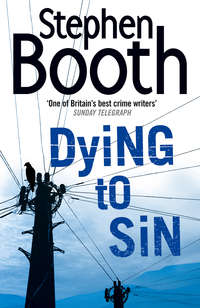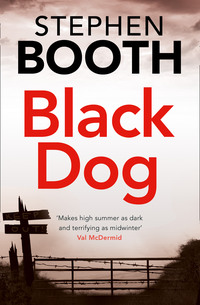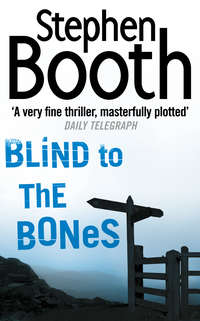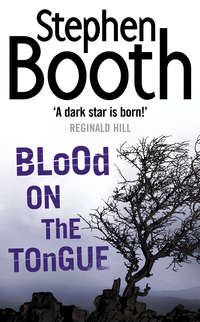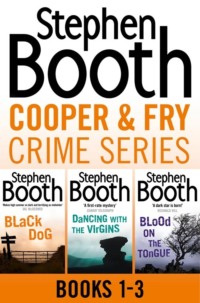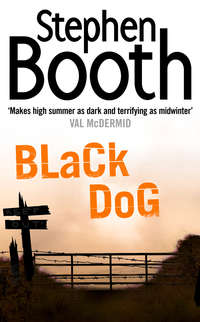
Полная версия
Lost River
Cooper remembered the Wheel Inn particularly. The two ‘teams’ – if thousands of people could be referred to as a team – came from the north and south sides of the town and were known as the Up’ards and Down’ards. Compton was Down’ard territory, and the Wheel one of their favourite gathering places before the match.
Inside the station, he didn’t have too much difficulty persuading Sergeant Wragg to let him have copies of the statements from the witnesses to Emily Nield’s death in Dovedale. There was a small sheaf of them, collected by Wragg’s constables as they intercepted members of the public leaving the scene.
‘Emily was a pupil at Parkside Community Junior,’ said Wragg as he gave Cooper the file. ‘I thought a copy of her photograph might be useful.’
‘Thanks.’
The photo was clipped to the first page. In it, Emily Nield was pictured in a green sweatshirt with her school logo, and was grinning cheekily at the camera, with one slightly crooked tooth prominent in her smile.
Seeing the photograph was a shock for Cooper. He hadn’t seen the girl in life, and could not have described her if he’d been asked to. Nor could he have recognized her from the photograph. As far as Cooper was concerned, she bore absolutely no resemblance to the body he’d held in his arms in Dovedale.
But that was what death did to you. In a few tragic moments, Emily Nield had become a different person. Unrecognizable.
‘The son attends Queen Elizabeth’s Grammar School here in the town,’ said Wragg. ‘But I suppose you don’t want to know about him.’
The file also included the Nields’ own statements. Cooper had already got their version of events first hand, but he accepted the copies from Wragg and tucked the file under his arm.
‘Thank you for this. It’s appreciated.’
‘No problem. Is there anything I need to know?’
Cooper hesitated, decided he could trust Wragg as a colleague.
‘It’s just a suspicion. I thought I saw someone I recognized among the bystanders in Dovedale.’
‘Ah. Someone who shouldn’t have been there?’ asked Wragg astutely.
‘Yes. I’m going to do a check on the Sex Offenders’ Register, to see if I can make an ID.’
Wragg nodded. ‘Let me know, won’t you? He might be one of ours.’
‘Of course.’
A look of concern crossed the sergeant’s face. ‘You don’t think this person was involved in Emily Nield’s death in some way?’
‘Let’s hope not,’ said Cooper. ‘I really hope not.’
Outside, he paused to adjust to the glare of the sun, and dug out his sunglasses from a pocket.
To his right, where Compton became Dig Street, he saw two supermarkets standing side by side near the bridge over Henmore Brook – Somerfield’s standing right next door to the Co-op. Behind them was the Shaw Croft car park, where the Shrovetide football game was kicked off or ‘turned up’. A few years ago, Prince Charles had arrived to be ‘turner-up’. He was a great lover of tradition.
Round the corner in St John Street, Cooper passed Ashbourne’s famous Gingerbread Shop with its original wattle and daub frontage. He supposed the town was very attractive in its own way. But it wasn’t Edendale.
Gavin Murfin had been calling him from West Street, no doubt wondering where his new Acting DS had disappeared to for so long. He wasn’t used to that when he was working for Diane Fry.
‘I got those print-outs for you, Ben,’ he said. ‘There aren’t many entries on the register in the Ashbourne area. Are you sure you don’t want me to widen it out a bit? Derby is only twenty minutes down the road, after all.’
Cooper knew he was right. Visitors to Dovedale came from many miles around. It was probably a futile exercise, the list too long for him to plough through in search of a half-seen profile. On the other hand, the fact that the face he’d seen was familiar meant that the individual concerned must be from this area, at least from Derbyshire. Well, didn’t it? Or could his memory be playing some trick on him, throwing up a recollection of a photograph he’d seen in a bulletin from another force, or even glimpsed in a newspaper or on the TV screen.
‘We have to start somewhere, Gavin. That will do for now.’
‘I still don’t know what this is about, Ben.’
‘Sorry. I’ll explain it to you later.’
Murfin’s voice became muffled, as if he was shielding the phone with his hand.
‘And where the heck are you? I’ve been covering for you. But, mate –’
‘I’ll be back soon.’
With a deep sigh, Murfin accepted his reassurance. ‘I hope I actually make it to my thirty, Ben. I’m afraid Superintendent Branagh might kill me before that.’
Fry felt sure some of these Birmingham city-centre under-passes were exactly the way they’d been when she drove through them in her very first car, a white Mini. Particularly this one under the Paradise Circus island. It had grey walls, and a black roof so low that no natural light penetrated the tunnel. It was probably a metaphor for something, diving underground into this grim, lightless world, but knowing that you would emerge a minute later, out into the sunlight.
As she came back above ground, Fry caught a glimpse of the old Paradise Forum shopping centre, which was supposed to have been scheduled for demolition. And next to it was the brutalist Central Library, described by Prince Charles as looking more like a place for burning books than for keeping them in. These buildings seemed old now, though they were built in the mid seventies. Well, thirty or forty years was a lifetime in the history of Birmingham architecture. Buildings she remembered being under construction while she was growing up were already being pulled down as obsolete.
Turning into Broad Street, she passed billboards announcing the site of the new Library of Birmingham. She had been booked into a hotel in Brindleyplace, part of Birmingham’s 1990s revival – a canalside development containing offices, bars, restaurants, an art gallery, a radio station, and even the National Sea Life Centre.
Arriving at the hotel, Fry entered a lobby like a piece of abstract art. Sofas and armchairs were blocks of red and blue on a yellow background. Cylindrical white pillars framed a zig-zag turquoise staircase. She felt as though she’d walked into a piece of abstract art.
The receptionist at the desk wished her a good stay, but hardly looked at her. That was the way she liked it – not as it was in Edendale, where everyone wanted to know who she was and where she came from.
She found herself in a room equipped with an iMac computer and satellite TV. In reception she’d seen a library of CDs and DVDs. She could always watch the latest romcom if she got really bored.
The front of the hotel looked down Spine Road towards the Central Square of Brindleyplace, with the Italianate arcade and campanile of the 3 Brindleyplace office block filling most of the view at the bottom of the square. Fry strained her neck to look southwards, over Broad Street, but saw only more hotels and offices. Even from several floors up, there was no hope of a distant enough view to see the Lickey Hills, which lay ten or twelve miles south of the city centre.
The Lickeys had been her first experience of countryside as a child. Perhaps the only one, unless her memory was successfully blocking out the others. There had been a train ride with her foster parents through Edgbaston and out past the huge Longbridge car plant, where Rovers were still being produced then. Arrival at a small railway station in Barnt Green had been followed by an uphill walk to Lickey itself.
She recalled bluebell woods – so what time of year would that have been? She wasn’t sure now. But she did remember being urged and harried to the top of Beacon Hill, where on a clear day they said you could see thirteen counties. Old counties, that would have been, though. Most of what you saw now was the metropolitan sprawl of the West Midlands.
Beacon Hill was supposed to be the highest point in a direct line west from the Urals. You’d need a really clear day to see Russia. At less than a thousand feet, it was half the height of many of the Peak District hills. But it seemed high enough to her.
To the north, she’d looked out over the M5 towards Dudley and the Black Country, those small industrial towns of her childhood crouching on the skyline. Then she’d turned to the northeast, and found herself gazing all the way to Birmingham city centre. Its towers stood clustered together, with the BT Tower and the cylindrical shape of the Rotunda easiest to pick out, but all of them faintly blurred, as if they were standing in a mist. There was something mysterious about the sight, a fascination that seemed to call to her. It was like the first glimpse of the Emerald City at the end of the yellow brick road. The distance and perspective had made that island of tall buildings look like some far-off promised land, a place she could reach only by hacking her way through the forest of suburbs that stretched for miles at her feet. Rubery, Bournville, Selly Oak, Edgbaston. Their very names made them sound like obstacles in her way. They were surely Munchkin Country.
She vaguely remembered hearing her foster parents’ voices telling her it was possible to see beyond Birmingham, right out to the countryside at Barr Beacon and Cannock Chase. But she hadn’t bothered trying. That view of the city was enough for her.
The view from Beacon Hill would be quite different now. There were more glass towers in the city centre, with the old landmark of the Rotunda almost obscured by bigger, taller, newer buildings. Most of the Longbridge car plant had disappeared completely since the collapse of MG Rover and the arrival of the Chinese. The results of large-scale demolition must have left a huge hole in the landscape of south Birmingham. She imagined that loss would be all too obvious from the Lickeys.
She checked out the bathroom and the shower in her room, turned the TV on and off with the remote. She felt quite at home in an anonymous hotel. That was what hotels were all about, making you feel at home. Being alone among strangers was comfortable. There were no painful reminders. The stresses of life were suspended, and you could lie back on your bed, rootless and free. A bed that had been made by someone else, too. Wonderful.
Stretching out on the king-size bed, Fry decided she ought to face up to what she would go through during the next few days. She didn’t want anything to come as a shock.
Gareth Blake had explained it all to her that day in Branagh’s office. Most of it she didn’t need explained, in theory. But it was different to hear it spelled out, when you knew the ‘victim’ they kept referring to was yourself.
‘Diane, we’ll understand if you say you’ve moved on and you don’t want to testify. But there are things we can do. A victim can agree to interview without any commitment to give evidence.’
‘Don’t keep calling me the victim.’
Tm sorry, I’m sorry. Look, you might not be sure about this until you re-read your own statement. That’s often what we find. A woman has tried to forget the incident, put the trauma behind her – of course. But then she goes back and reads the statement she made at the time, and she changes her mind. She agrees to go ahead and give evidence in court.’
Fry remembered Branagh’s face had been impassive during the conversation. For once, she wasn’t weighing in to put pressure on. And she recalled thinking there must be a reason for that. Everything Branagh did had a reason.
Fry had wiped her palms on the edge of her jacket, then tried to disguise the gesture. It was too much of a giveaway.
Blake had leaned forward earnestly.
‘In court, you can have a screen, if you want. So that the accused can’t see you and you can’t see him. We often take victims into court to show them where they’ll give evidence from, and where everyone sits. We might not need to do that for you, obviously. But you understand what I’m saying? We bend over backwards to make it easier.’
‘Easier?’
‘Less difficult, then.’
She ought to be better prepared than the average victim. At least she knew the jargon. Like every other area of policing, the investigation of rape was littered with impenetrable acronyms. Victims were dealt with by an STO and an ISVA. A specially trained officer and an independent sexual violence advisor. A case file would contain a ROTI, a record of taped interview, in preparation for the EAH, an Early Administrative Hearing. For a member of the general public, the terminology could be baffling.
The first stage of the actual court process would be a committal hearing at a magistrates’ court. She would not have to attend that, as her statement would be enough. The case could then proceed to crown court, where the second stage would be the trial, with a judge and a jury, a prosecution barrister to go through her evidence, another for the defence to challenge what she said.
If her attacker was found guilty or pleaded guilty, the judge would be given an impact statement before sentence, to explain how the attack had affected her life. Nothing was held back.
‘In every case I’ve dealt with since joining the cold case unit, victims have been delighted to be approached. They say that a conviction brings closure, often after many years of torment.’
‘But you do need consent to go ahead.’
And Blake had hesitated.
‘In almost one hundred per cent of cases.’
Well, the treatment of rape had changed in the last couple of decades. The West Midlands had a dedicated facility, the Rowan Centre, where victims could pass on information without giving a name or address, or worrying about making a statement. That option had never been available to her.
Throughout this process, she must keep reminding herself one thing. She wasn’t part of the investigating team for this enquiry. On the contrary, she was the IP, the Injured Party. That was how she would be referred to in the official police documents. She was the IP.
When she left the hotel, Fry heard music coming from the direction of The Water’s Edge. She bought herself a sandwich in Baguette du Monde near the multi-storey car park, and idly studied the programme for the Crescent Theatre while she ate it. Something is rotten in an upper-crust Danish family gathered to celebrate the 60th birthday of their wealthy patriarch. The occasion descends into nightmare when the eldest son accuses his father of sexual abuse. That would be a comedy, then. She might give it a miss.
The Water’s Edge was busy with people. The development had formed a complex of bridges where three canals met, connecting Brindleyplace to the ICC and NIA. Narrowboats were moored to the towpath, one of them converted into a café. The music she’d heard turned out to be a jive group on the bandstand, playing to customers eating outside at the restaurants. Their sign said Jive Romeros.
It was funny how canals had become a decorative feature. They had been such a part of the industrial revolution, yet they were surviving the wholesale demolition of the factories they’d once served. They were like all those Victorian pubs, preserved in the middle of modern office developments and retail parks.
She could see some of the city centre’s glass towers from here. Most prominent among them was the Beetham Tower on Holloway Circus. The huge glass panels in its upper levels made the building look as if its walls had been blown away in a bomb blast, exposing the hidden lives of the people behind them.
A full-scale crown court trial would mean expensive defence barristers being shipped into the city. Would they take accommodation at Brindleyplace? No, she guessed not. They would stay at the Radisson SAS in the Beetham Tower, and drink downstairs at the Filini Bar.
Around the corner from 3 Brindleyplace, Fry could see the entrance to the National Sea Life Centre, a fan-shaped building backing on to the canal. It boasted a transparent walk-through underwater tunnel, yet it was about as far from the sea as you could get in the UK.
She thought of all the people she’d dealt with as a police officer over the years. All the victims, all the families. And all the children, of course. Particularly the children. There were some victims she’d let down, when she ought to have been able to help them. Everyone said you shouldn’t allow any of that to get to you, that you should just let it go and move on to the next case, to another victim looking for justice, needing your help. But sometimes it wasn’t so easy.
And she thought of all the times she’d observed the behaviour of victims and felt a lack of sympathy at their weakness, their hesitation when faced with a decision. All the times she’d wanted to tell them that it wasn’t as bad as all that.
Fry had so often seen people going into court to confront their past. The worst part of the process was waiting in the witness room, and the long walk down the corridor to take the stand. She’d watched people taking that walk. It might only be a few yards, but when you were going to face your own demons, it could seem like a million lonely miles.
‘So what do you say, Diane?’
‘I need time.’
‘Of course. All the time you want.’
For herself, Fry knew that the long walk down that corridor would be the most difficult thing she’d ever done in her life.
Cooper stopped a few miles out of Ashbourne and pulled off the A515 into a car park serving the Tissington Trail, close to the village of Alsop. Dovedale was just over the hill to the west – the Milldale end of the valley, up past the boardwalks beyond Reynard’s Cave and the weirs under Raven’s Tor.
He couldn’t put off reading the witness statements any longer. And he was afraid of being distracted when he got back to the office, too caught up in other things, all those unavoidable demands on his time.
Ideally, the statements ought to be read on the ground, in Dovedale itself, so he could picture where the witnesses were standing. But it would take too long right now to battle his way in and out of the dale against the traffic, and mingle with the crowds. That would have to wait for another time.
The statements were all pretty brief. The one thing that became clear was that no one had seen everything. Some witnesses recalled seeing the dog go into the river, but not the girl. Others had seen Emily and her brother playing on the bank, throwing sticks for Buster. Then they’d looked away, absorbed in their own concerns, until all the shouting began.
A few members of the public stated that they had actually seen Emily run into the water, then fall and bang her head on a rock. He could see why Sergeant Wragg felt the results of the interviews were conclusive.
But Cooper was bothered by the wording of these statements. ‘Yes, I saw the little girl fall and bang her head.’ ‘She was knocked over by the dog. The rock struck her on the side of the head.’ ‘She couldn’t catch the dog. I saw her slip and float downstream towards the rocks.’ One lady believed there had been a whole crowd of children and dogs in the water, too many for her to be able to distinguish one little girl in a green summer dress. Meanwhile, her friend had seen the girl distinctly, but swore the dress was blue.
All of these people had been within a few hundreds yards of the incident. Strange that none of them had noticed the child’s parents. How odd that none of them had seen what Cooper saw – the man standing on the bank, his hands raised, fingers dripping water. Robert Nield was a striking enough figure at any time. You’d think he would have been observed by at least one of these eyewitnesses.
Конец ознакомительного фрагмента.
Текст предоставлен ООО «ЛитРес».
Прочитайте эту книгу целиком, купив полную легальную версию на ЛитРес.
Безопасно оплатить книгу можно банковской картой Visa, MasterCard, Maestro, со счета мобильного телефона, с платежного терминала, в салоне МТС или Связной, через PayPal, WebMoney, Яндекс.Деньги, QIWI Кошелек, бонусными картами или другим удобным Вам способом.


